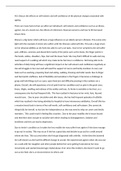M3: Discuss the effects on self-esteem and self-confidence of the physical changes associated with
ageing
There are many factors that can affect an individual’s self-esteem and confidence such as an illness,
ageism, loss of a loved one, the effects of retirement, financial concerns and how to fill increased
leisure time.
Illness is a big factor which will have a huge influence on an elderly person’s lifestyle. This comes into
light with the example of Annie who suffers with the illnesses called arthritis. This puts a huge strain
on her physical abilities as she feels less able to carry out tasks. Due to her symptoms she will suffer
pain, stiffness, soreness and discomfort mainly of the joints such as the knees, the finger points in
the hands, ankles, shoulders, hips, feet and the lower back. She may find it difficult to walk and may
need support of a walking aid which may make Annie feel low in confidence. Not being able to do
activities of daily living will have a significant impact on her self-esteem and confidence negatively as
she will struggle on her own and will need the support of carers and family members to carry out
tasks such as washing, preparing food and eating, walking, dressing and toilet needs. Due to finger
and hand joints stuffiness, lack of flexibility and sensation in the fingers it becomes a challenge to
grasp and hold things such as a pen, open food jars and difficulty pressing in the numbers on a
phone. Overall, she will experience a lot of pain from her condition such as pain in the groin area,
knees, thighs, swelling and redness of the ankles and toes. As Annie is unstable on her feet, as a
consequence she has had frequent falls. This has resulted in fractures to her wrist, foot, hip and
muscle tears. Due to poor circulation and skin issues, she has had frequent episodes of cellulitis
which has resulted in her being admitted to hospital to have intravenous antibiotics. Overall this has
a massive knock back in terms of her self-worth, self-confidence and self-esteem. She cannot do
things fully for herself, so has lost her independence as she may need to relay on carers and family
members. This could result in feeling like a burden. Due to her poor mobility she is house bound
and therefore does not get to socialise with others leading to disengagement, isolation and
loneliness and this can lead to depression.
Due to Annie’s condition as it makes her less mobile she may suffer from ageism if she does manage
to go out in society. This may occur if she has a good day and decides to go out for a walk around
where she lives. This occurred when she first got diagnosed with arthritis. At the time this lowered
her self-esteem as she had this difficult change to accept. She experienced ageism when she was out
on a walk with her daughter and other people behind her were getting frustrated at her slow
movements and started shouted age related abuse. Ever since this incident, she doesn’t want to go
out as she feels she is an inconvenience to others and




